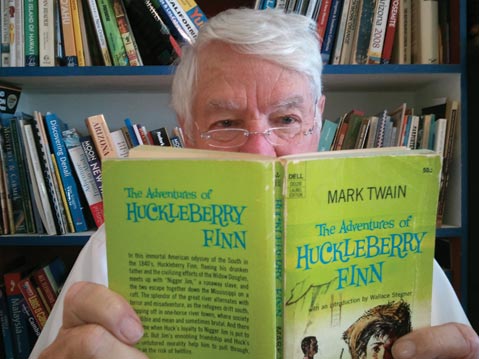Don’t Ban My Book
Don't Cut My Library

LIBRARY’S HURTIN’ FOR CERTAIN: I spent Banned Books Week paging through all the banned books I could find in my jammed, messy office at home. But then I trotted down to the Santa Barbara Public Library, and the problem there was whether one of these days there might not be any new books on the shelves, banned or otherwise.
Mean Old Man Recession has slashed the book budget, drastically cut staffing, and closed the main library and Eastside branch on Mondays. It would cost hundreds of thousands of dollars a year to reopen the main library on Mondays, and there’s no money for that. The state has abolished all library support, unless a miracle occurs in Sacramento.

Who needs libraries? Every day, more than a million Californians visit a library, and that’s more than visit Disneyland in a month.
Santa Barbara County has given the library a $223,304 fiscal finger, slashing its contribution by 15 percent. All in all, “It’s a substantial reduction for us,” said Roger Hiles, library services manager. The book-buying budget is down to $267,209 after a $66,000 haircut. The City of Santa Barbara, to its credit, has maintained its funding at status quo, $3.9 million.
In Carpinteria, the library — “About the only cultural center we have,” one resident told me — is closed Sundays and Mondays. Maybe they should start “Nude Dancing with the Authors” to raise dough.
I watched a line of quiet Peabody School kindergarteners file into the Santa Barbara library the other day, hand-in-hand, eyes wide, and I wondered what kind of a reading future they have to look forward to. But Hiles has some encouraging news.
A major fundraising drive is in the offing, and one aim is to turn the lower level into a wonderful children’s reading center, Hiles said. The design goes to the City Council soon. And I know we’ll be getting checks from the likes of generous part-time residents Oprah Winfrey ($2.7 billion net worth), Harold Simmons ($9.3 billion), Ty Warner ($2.4 billion), and Craig McCaw ($1.6 billion).
And thanks to the library’s ebooks program, you don’t even have to go into the place to borrow a book. Just call for it online. Hiles told how staffer Joe Cantrell found himself in Brazil and (horrors!) out of books. He used his cell phone to tap into the library’s ebooks program and downloaded stuff. Nationally, about 40 percent of the people who go into a library do so to use computers, Hiles said.
BUY BANNED BOOKS! Maybe if we’d all bought more challenged and banned books, we’d still have Borders and Barnes & Noble downtown instead of the dress shops that replaced them.
Walking past Chaucer’s bookstore in Loreto Plaza the other morning, I was astounded to see Ernest Hemingway’s The Sun Also Rises in the window of forbidden reads. I cut my literary teeth on Hemingway, and The Sun Also Rises was my first baptism into his heady world of American expatriates in 1920s Paris. It was burned in Nazi bonfires in 1933, according to the American Library Association, apparently because it too accurately portrayed post–World War I events.
It’s on my bookshelf near perhaps the most often challenged book in U.S. history, Mark Twain’s The Adventures of Huckleberry Finn. It has earned this status largely because the “n” word appears 219 times, causing great offense to many readers and fainthearted English teachers. In fact, a new expurgated edition has come out in the South, a travesty replacing the word with “slave.” Samuel Clemens (Twain) would blow a fuse.
Every year, small minds, mostly in rural libraries and school boards, want to ban certain books. Among the most frequently challenged titles are the Harry Potter series (Gasp! Magic and wizardry!), The Da Vinci Code (hands off our religion), The Diary of Anne Frank (too sexy, “too depressing”), To Kill a Mockingbird (race and sex no-nos), and, ironically, anticensorship Fahrenheit 451 (don’t take away government’s power to ban).
BACK TO WORK: Rep. Lois Capps dropped into The Santa Barbara Independent offices to campaign for President Obama’s jobs bill, and let’s hope it contains some library money that will survive after the Republicans beat the bill like an old rug. For one thing, Capps said, it would cut payroll taxes in half for 160 million workers, trimming taxes by $1,740 for a typical California family earning $56,000 a year. For her efforts, Capps is wearing a figurative bull’s-eye: GOP chiefs are targeting her in 2012.



